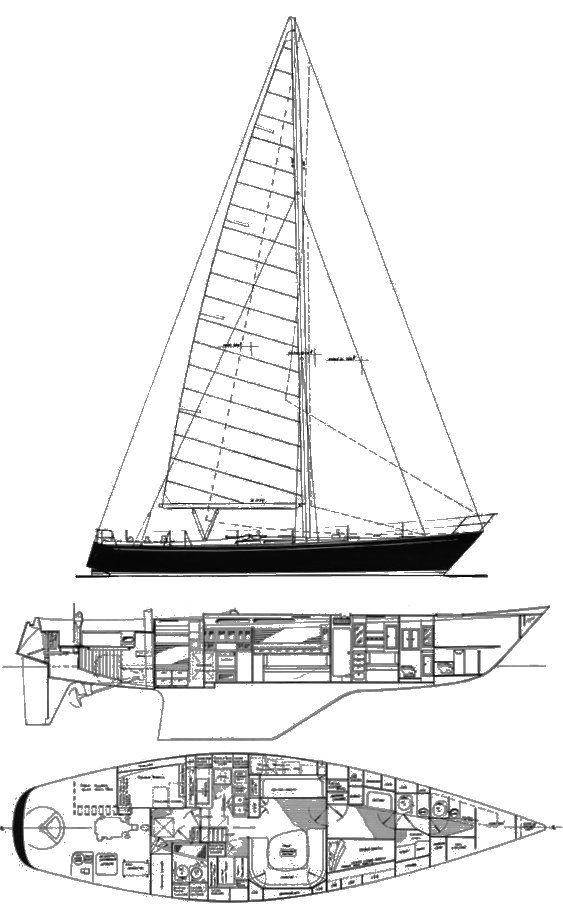The Skye 51 stands as a testament to the robust and seaworthy cruising yachts that emerged from Taiwan's flourishing shipbuilding industry in the late 20th century. Designed by the respected American naval architectural firm Kaufman & Ladd, and built by the Mao Ta Shipyard, this vessel was conceived as a formidable long-distance cruiser. Known for its solid construction and classic lines, the Skye 51 has earned a reputation as a comfortable and reliable platform for offshore voyaging, appealing to sailors seeking durability and capable performance in challenging conditions.
Skye 51 Information, Review, Specs

- Make
- Model
- Number Built
- 18
- Production Year(s)
- 1980 - ??
The Skye 51 entered production in 1980, a period when Taiwanese shipyards, particularly Mao Ta, were gaining international recognition for their commitment to building high-quality, solid fiberglass yachts. While Mao Ta Shipyard, an offshoot of Mao Ta Lumber and Yacht Corp., had already established itself with models like the Oceanic 36, the Skye 51 represented a significant step into larger cruising vessels. The design mandate for F. Michael Kaufman and Robert A. Ladd was to create an ideal long-distance cruising yacht, emphasizing reliable and safe sea-keeping characteristics.
Mao Ta Shipyard's manufacturing ethos, rooted in durability and seaworthiness, perfectly complemented Kaufman & Ladd's design philosophy. The collaboration also involved Alden Yachts, which supervised the build process for some models. During its production run, approximately 18 units of the Skye 51 were built. The vessel was offered with either a cutter or ketch rig, providing versatility to suit different sailing preferences, 8]. Additionally, due to various commercial arrangements, some units were marketed as the MAO TA 51 or, through Pan Oceanic Marine in the USA, as the OCEANIC 51.
Sailing Performance and Handling
The Skye 51 is engineered for confident offshore performance, a hallmark of its design by Kaufman & Ladd. With a Sail Area to Displacement ratio of approximately 17.29, she is well-powered for a cruising yacht of her size, suggesting a capable performance in a variety of wind conditions, including lighter airs, without being overly burdened. Her Ballast to Displacement ratio of around 0.40 indicates a stiff and stable platform, enabling her to stand up well to strong winds and providing a comfortable motion in a seaway.
Further reinforcing her cruising capabilities, the Displacement to Length ratio of approximately 218.8 categorizes the Skye 51 as a moderate displacement vessel, striking a balance between swiftness and the robust carrying capacity required for extended voyages. Owners and reviewers often describe the Skye 51 as a "strong and fast" boat with a "reliable and safe sea keeping character," reinforcing its design intent for blue-water passages. Her hull speed is calculated at 8.78 knots [2,. The design includes a deep cockpit and wide side decks, enhancing safety and ease of movement while underway.
Accommodations and Layout
The interior of the Skye 51 is characterized by a practical design aimed at maximizing comfort and livability during long periods aboard. While specific headroom figures are not consistently available, the layout is typically well-appointed, providing a pleasant living environment. A common arrangement features a spacious double owner's cabin, often located aft, complete with its own private head and ample storage, a crucial amenity for cruisers.
The salon typically offers comfortable seating and dining areas, while the galley is designed for functionality at sea. Details from original brochures often showcase the thoughtful interior layouts, highlighting the quality of finish and materials characteristic of Taiwanese-built yachts of the era, which often included generous use of wood trim. Sufficient ventilation and storage throughout the boat contribute to its reputation as a liveaboard-friendly vessel.
Owner's Perspectives
Owners of the Skye 51 consistently praise its "solid quality build in the classic style," a testament to the robust construction by Mao Ta Shipyard. The vessel is highly regarded for its reliability and seaworthiness, making it a popular choice among those seeking a capable and comfortable platform for long-distance cruising. The inherent durability of these vessels means that many remain actively sailed decades after their initial launch, with owners often engaging in online forums to share experiences and knowledge, a strong indicator of enduring satisfaction. While specific recurring problems are not widely documented, as with any vessel of this age, general maintenance and potential refits are common topics among the owner community, underscoring the importance of good care for these well-built yachts.
Measurements
Construction & Hull
- Construction Material
- Fiberglass (Solid)
- Hull Type
- Monohull Sailboat
- Keel Type
- Fin
- Rudder
- 1x Skeg-Hung
- Ballast
- 15500 lbs
- Displacement
- 38708 lbs
- Water Capacity
- 200 gal
- Fuel Capacity
- 140 gal
Engine
- Engine Make
- Perkins
- Engine Model
- —
- Engine Type
- —
- Engine HP
- 85
- Engine Count
- 1
- Drive Type
- —
- Fuel Type
- Diesel
Rig & Sails
- Rig Type
- Cutter
- P (Main Luff)
- 60 ft
- E (Main Foot)
- 17.8 ft
- I (Foretriangle Height)
- 66 ft
- J (Foretriangle Base)
- 22 ft
- Forestay Length (est)
- 69.57 ft
- Main Sail Area
- 534 sqft
- Foretriangle Sail Area
- 726 sqft
- Total Sail Area (Reported)
- 1260 sqft
- Total Sail Area (Calc)
- 1260 sqft
Dimensions
- LOA
- 50.78 ft
- LWL
- 42.92 ft
- Beam
- 14.25 ft
- Draft
- 7 ft
- Max Headroom
- -
- Air Draft
- 70 ft
Calculations
- Hull Speed
- 8.78 kn
- Pounds per Inch Immersion
- 2